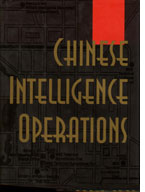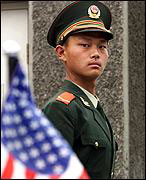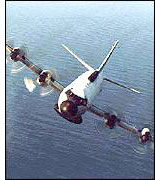There are no friends in the spy game, says analyst Nick Eftimiades
 Nicholas Eftimiades is the author of a definitive 1994 study of Chinese espionage, Chinese Intelligence Operations, which is the culmination of his twenty years in the field with the CIA, State Department, U.S. Customs and as senior intelligence officer at the Pentagon’s version of the CIA, the Defense Intelligence Agency.
Nicholas Eftimiades is the author of a definitive 1994 study of Chinese espionage, Chinese Intelligence Operations, which is the culmination of his twenty years in the field with the CIA, State Department, U.S. Customs and as senior intelligence officer at the Pentagon’s version of the CIA, the Defense Intelligence Agency.
The book also lifts the veil on the clandestine methods of a country that continues to tantalize the West with its huge economic promise (President Clinton granted it Most Favored Nation status despite Congressional inquiries into a storm of allegations that the Chinese stole high-tech secrets for years from Los Alamos and other federal weapons labs) and continues to baffle the West with a nationalism that has rarely wavered in its 3,000-year history and rarely been understood.
“I think that our intelligence, as well as policy apparatus, has a real tendency towards mirror-imaging, as we say in the analytical ranks: in looking at your adversaries and believing they think and perceive and will act the same way that you do,” Eftimiades says. “And the result is an inability to understand what Chinese intelligence is, how it operates, so that you can effectively counter it. And I would say government-wise we have had that arrogance.”
Raised in Queens, New York, Eftimiades earned a degree in East Asian studies from George Washington University, studied in Taiwan, and visited mainland China several times as a student, but doubts he will return anytime soon now that he is a recognized authority on their intelligence.
“Are you kidding?” he laughs. “Going back is not the problem. Getting back out is.”
Why such a blindness by American intelligence about China?
When I lecture and I have two hundred counterintelligence people in the audience, or intelligence people, and I say, “How many of you speak Chinese?” My hand goes up, and maybe, maybe, another hand goes up in the crowd. And that’s it...The problem is not even just language, it’s a cultural awareness, it’s a knowledge of the politics, and the government, and the nation.
Is that ignorance across the board?
The (CIA) is probably not quite as bad...Military counterintelligence isn’t quite as bad, believe it or not, because they tend to have, at least, more of a recognition and awareness that they don’t know the subject matter and are willing to go out and learn, because they think it has more of a military impact.
So can the American intelligence community reform itself?
No, in fact I wrote in my book, a bureaucracy not in motion will tend to stay not in motion until someone forces it to move. So, yes, I warmly welcome Congressional action in this regard.
Can the reforms become too politicized?
I think there are political components to anything in our system of government. But wouldn’t it be a wonderful thing if we had a long-term, systematic plan to address some of the shortcomings we’ve identified in our counterintelligence and intelligence systems?
Do you see that happening anytime soon?
I think it’s too early to say at this point.
 Is the widespread recruitment of nationals to spy unique to the Chinese or common in the intelligence field?
Is the widespread recruitment of nationals to spy unique to the Chinese or common in the intelligence field?
I would say that the scale by which Chinese intelligence operates dwarfs other countries. And I think most intelligence experts will agree with that, simply because of the breadth of numbers that (the Chinese) employee...(But) using the process of nationals, absolutely, other countries do it. That’s nothing specific to the Chinese.
It doesn’t matter if the country is “friendly”?
No, there’s no such thing as friends in intelligence agencies. I grew up for 15 years with the adage that there’s no such thing as a friendly intelligence service.
What makes Chinese nationals comply?
I debriefed some of the “assets” who were cooperating with their intelligence service back home and their story was universally and always the same: that they were doing this to help China, to help the Chinese people. And so, there are very, very strong ethnonationalistic feelings, maybe not political, maybe not tied to the Party at all, the Communist Party, but tied to the Chinese people.
By relying on civilians do they have to simplify their methods and so make them more obvious?
We all rely on civilians...This is the nature of espionage. When China looks at conducting espionage in a foreign country, they presumably get an intelligence officer, who gets a civilian, whether it’s a Chinese national or a national of that specific country who has access to that information to try and collect it for them. Now there’s usually a process of training that goes with that, a process of setting up secure communications between the two individuals and everything that goes through to maintain the safety of the asset, or agent, operating to collect your information. And they use that process very well.
 Do the Chinese now have enough secrets to pose a military threat in the next decade?
Do the Chinese now have enough secrets to pose a military threat in the next decade?
No, not a strategic threat. Your kids can sleep safely. They’re not going to come over here, certainly not. Could they punch a hole in a U.S. warship with a cruise missile? Yes.
What if they continue stealing secrets at this rate?
Intelligence activities by themselves don’t become threatening. It’s only when the national interest, in this case the nation’s military, becomes threatened that all of a sudden having intelligence activities turns the tide, so to speak. And the fact that China doesn’t present a strategic threat to the U.S. has allowed it to operate out of the limelight of concern.
Now that Chinese espionage is in the limelight, will it change its methods?
I don’t know. It should be interesting, though. I think there’s a little fallout and we have to wait and see what comes of this in the next six months. Were I them, at this time, I’d probably have a stand-down on most of the activities they’re conducting, because the last thing they want is somebody to get arrested or rounded up for conducting espionage, and adding fuel to the fire.
How did you get interested in Chinese intelligence?
I started, I guess, in my younger life by studying martial arts. And that dovetailed into an interest in China, and one year when I was in college I learned of an opportunity to go over and study in China, actually in Taiwan. And I did one year, just picked up and went...So from there, my life the past twenty years has been as a China watcher.
What fascinates you about the country?
It’s the dynamics of the culture, the deep, rich, history that China has...It’s really interesting, but when you look at China and Chinese history, it is replete with the belief over thousands of years that the further you were away from China, the more of a barbarian you were. And that’s why when Caucasians first came to China, and when I went, people called them a foreign devil, some of the older ones, and they really view it that way. The cultural arrogance of China I found rather fascinating.
How were you able to research a book on Chinese intelligence in such a society of suspicion?
The impact of an incident like Tiananmen amongst even (China’s) intelligence officers was pretty severe. Plus, when word got out to select Chinese individuals that someone was doing this, I had a number of people willing to cooperate...People who felt genuinely bad about what had occurred at Tiananmen.
Does having sources and being an expert on foreign intelligence also put you under suspicion with your own government?
Oh, are you kidding? (When researching the book) I was polygraphed, I had my phones monitored, I had my computers downloaded, I’ve been under investigation more than anybody. It was a very, very stressful time...It was investigation after investigation.